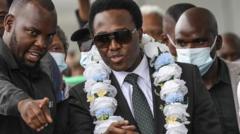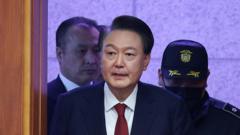After a contentious election period marked by unrest, opposition leader Venâncio Mondlane has signaled a readiness to cooperate with the Mozambican government, provided certain conditions are fulfilled.
Mozambique Opposition Leader Offers Political Cooperation Amid Crisis

Mozambique Opposition Leader Offers Political Cooperation Amid Crisis
Venâncio Mondlane expresses willingness to join government if demands are met by President Chapo.
In a recent interview with the BBC, Venâncio Mondlane, Mozambique's prominent opposition leader, indicated a potential willingness to occupy a role in the government led by President Daniel Chapo, contingent upon the resolution of ongoing political tensions following disputed elections. Mondlane, who contested the presidency for the first time in October, reiterated his assertion that the election results were manipulated, a claim that Chapo has publicly denied. The national court, nonetheless, upheld Chapo's victory, declaring he secured 65% of the vote against Mondlane's 24%.
Amid an environment marked by post-election violence that resulted in approximately 300 casualties, Mondlane has laid out specific demands to end protests and foster dialogue. He has stipulated the unconditional release of about 5,000 individuals detained amid unrest, financial restitution for families of victims of police brutality, and medical care for those injured during clashes. He emphasized that only through these concessions would he consider negotiations with Chapo.
Chapo, who was sworn in as President on January 15, expressed his desire for an inclusive administration and indicated that discussions with opposition parties are underway. He committed to reforms aimed at improving electoral laws, safeguarding human rights, and enhancing freedom of expression. While acknowledging Mondlane's qualifications for a potential government role, Chapo stated these considerations would hinge on individuals meeting specific competencies and patriotic values.
As the newly appointed leader of the Frelimo party, Chapo aims to attract young voters amidst rising unemployment and demands for developmental changes. His administration seeks to stimulate both domestic and foreign investment to invigorate the economy and create job opportunities for youth, while Mondlane, who has garnered support from this demographic with his campaign slogan "Save Mozambique - this country is ours," remains a figure of significant influence.
With the country at a pivotal juncture, the potential for inclusive governance hangs in the balance as both leaders navigate the path away from recent violence and division.
Amid an environment marked by post-election violence that resulted in approximately 300 casualties, Mondlane has laid out specific demands to end protests and foster dialogue. He has stipulated the unconditional release of about 5,000 individuals detained amid unrest, financial restitution for families of victims of police brutality, and medical care for those injured during clashes. He emphasized that only through these concessions would he consider negotiations with Chapo.
Chapo, who was sworn in as President on January 15, expressed his desire for an inclusive administration and indicated that discussions with opposition parties are underway. He committed to reforms aimed at improving electoral laws, safeguarding human rights, and enhancing freedom of expression. While acknowledging Mondlane's qualifications for a potential government role, Chapo stated these considerations would hinge on individuals meeting specific competencies and patriotic values.
As the newly appointed leader of the Frelimo party, Chapo aims to attract young voters amidst rising unemployment and demands for developmental changes. His administration seeks to stimulate both domestic and foreign investment to invigorate the economy and create job opportunities for youth, while Mondlane, who has garnered support from this demographic with his campaign slogan "Save Mozambique - this country is ours," remains a figure of significant influence.
With the country at a pivotal juncture, the potential for inclusive governance hangs in the balance as both leaders navigate the path away from recent violence and division.




















